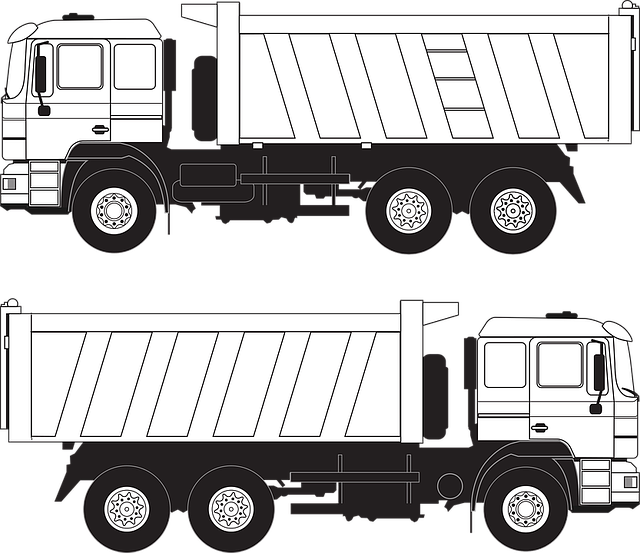The trucking industry is subject to a comprehensive set of regulations designed to ensure safety, efficiency, and environmental responsibility. These regulations, enforced by the Federal Motor Carrier Safety Administration (FMCSA) in the U.S., cover driver qualifications, vehicle maintenance, hours of service, and cargo handling. Trucking companies must actively manage compliance through ongoing training, vehicle inspections, and record-keeping to maintain their reputations and support a reliable supply chain. The integration of technology, including electronic logging devices (ELDs) and fleet management software, is essential for enhancing compliance efficiency and maintaining a competitive edge. Staying abreast of state and local regulations, as well as federal guidelines like the FMCSRs, is crucial for avoiding penalties and legal issues. Advanced technologies not only aid in compliance but also offer route optimization, fuel savings, and environmental sustainability. The trucking sector's focus on regulatory compliance, leveraging technology, ensures operational excellence and fosters a safer driving environment, embodying the industry's commitment to adhering to legal and ethical frameworks.
Navigating the complex landscape of trucking requires a steadfast commitment to compliance with industry standards. This article delves into the critical aspects of maintaining regulatory adherence within the trucking sector. We’ll explore the key regulations that govern truck and fleet operations, ensuring that your business stays on the right side of the law. Further, we will outline best practices for achieving compliance, emphasizing practical steps tailored to the trucking industry. Additionally, we’ll examine how leveraging cutting-edge technology can streamline your compliance efforts, keeping you competitive and compliant in an ever-evolving transportation environment.
- Understanding Industry Standards in Trucking Compliance
- Key Regulations Governing Truck and Fleet Operations
- Implementing Best Practices for Trucking Compliance
- Leveraging Technology to Maintain Compliance in the Trucking Industry
Understanding Industry Standards in Trucking Compliance

The trucking industry operates under a complex framework of regulations designed to ensure safety, efficiency, and fairness within the sector. Compliance with these industry standards is not merely a legal requirement but also a critical component for the successful and sustainable operation of trucking businesses. Navigating the myriad of rules set forth by regulatory bodies such as the Federal Motor Carrier Safety Administration (FMCSA) in the United States is essential for trucking companies to maintain their operational integrity and avoid costly fines or legal complications. These standards cover a wide array of aspects, from vehicle maintenance and driver qualifications to hours of service and cargo handling procedures. By adhering to these standards, trucking firms can enhance their reputation, ensure the safety of their drivers and other road users, and contribute to the overall reliability of the supply chain ecosystem.
Staying abreast of industry standards in the ever-evolving field of trucking requires a proactive approach and a commitment to continuous improvement. The standards are subject to periodic updates and amendments, making it imperative for companies to have robust compliance programs in place. These programs should include regular training for drivers and staff, thorough vehicle inspections, and up-to-date record keeping. By leveraging technology such as electronic logging devices (ELDs) and fleet management software, trucking companies can streamline their compliance processes, reduce the risk of human error, and maintain a competitive edge in the market. Engaging with industry associations and participating in relevant training programs can also provide valuable insights into emerging trends and best practices for maintaining compliance, thereby ensuring the smooth operation of trucking businesses within the legal and ethical framework of the industry.
Key Regulations Governing Truck and Fleet Operations

The trucking industry is subject to a multitude of regulations designed to ensure safety, efficiency, and environmental compliance within operations. Central to this framework are the Federal Motor Carrier Safety Regulations (FMCSRs) in the United States, which govern everything from hours of service to vehicle maintenance. These regulations, enforced by the Federal Motor Carrier Safety Administration (FMCSA), aim to reduce accidents, improve working conditions, and prevent environmental damage through stringent operational standards for trucks and fleets. Additionally, carriers must adhere to state and local laws, which can include specific routing requirements, emission controls, and traffic regulations that vary by jurisdiction. Compliance with these complex and multifaceted rules is critical for trucking companies to avoid fines, legal issues, and to maintain a reputation for reliability and safety in the industry.
Fleet operators must also be cognizant of the Department of Transportation (DOT) regulations, which set forth requirements for driver qualifications, hazardous materials handling, and vehicle inspection procedures. The Occupational Safety and Health Administration (OSHA) further mandates guidelines to ensure the well-being of drivers and other employees. Together with industry-specific standards from organizations like the American Transportation Association (ATA), these regulations form a comprehensive set of rules that guide trucking operations. Navigating this complex legal landscape requires diligent attention to detail, robust compliance programs, and continuous education for both management and staff within the trucking sector.
Implementing Best Practices for Trucking Compliance

In the realm of trucking compliance, adherence to industry standards is paramount for operational efficiency and legal conformity. Companies within the sector must implement robust best practices that encompass vehicle maintenance, driver safety protocols, and accurate record-keeping. Regular upkeep of trucks not only ensures roadworthiness but also minimizes the risk of accidents and costly downtime. Fleets should utilize advanced tracking systems to monitor compliance with hours of service regulations, thereby safeguarding the well-being of drivers and maintaining a consistent delivery schedule.
Furthermore, staying abreast of regulatory changes is crucial for trucking firms to maintain compliance. Continuous education and training programs for both management and personnel are essential to ensure understanding and implementation of new standards. By leveraging technology such as electronic logging devices (ELDs) and fleet management software, these businesses can automate compliance tracking, reducing the potential for human error and ensuring that all operations align with current transportation laws. In doing so, trucking companies not only protect their reputation but also contribute to a safer road environment for all.
Leveraging Technology to Maintain Compliance in the Trucking Industry

In the trucking industry, staying abreast of regulatory compliance is not just a legal necessity but a critical component for operational efficiency and safety. The integration of advanced technologies has revolutionized how carriers maintain compliance. For instance, electronic logging devices (ELDs) mandated by the Federal Motor Carrier Safety Administration (FMCSA) have significantly streamlined hours-of-service (HOS) tracking, reducing the likelihood of violations and enhancing road safety. Moreover, with the advent of telematics systems, fleet operators can monitor vehicle performance in real-time, ensuring that all trucks adhere to emission standards set by the Environmental Protection Agency (EPA). These systems not only aid in compliance but also provide valuable data for optimizing routes and reducing fuel consumption, further contributing to cost savings and environmental sustainability.
The adoption of enterprise resource planning (ERP) software has also transformed the way trucking companies manage compliance-related documents and records. By automating document management and ensuring that all necessary paperwork is stored in a secure, easily accessible digital format, ERP systems minimize the risk of non-compliance due to misplaced or outdated records. Furthermore, these platforms often include features for real-time reporting and audit trails, which are indispensable tools during compliance audits or when dealing with enforcement agencies. The use of technology in the trucking industry not only facilitates adherence to industry standards but also lays a foundation for continuous improvement and innovation in operational practices.
Adherence to industry standards is a cornerstone for the safety and efficiency of the trucking sector. By grasping the key regulations that govern truck and fleet operations, businesses can implement best practices to ensure compliance. Leveraging advanced technologies further solidifies this commitment, offering robust solutions to maintain regulatory standards. In conclusion, staying abreast of industry norms and utilizing cutting-edge tech tools not only safeguards your company’s reputation but also paves the way for a more secure and compliant trucking landscape.
